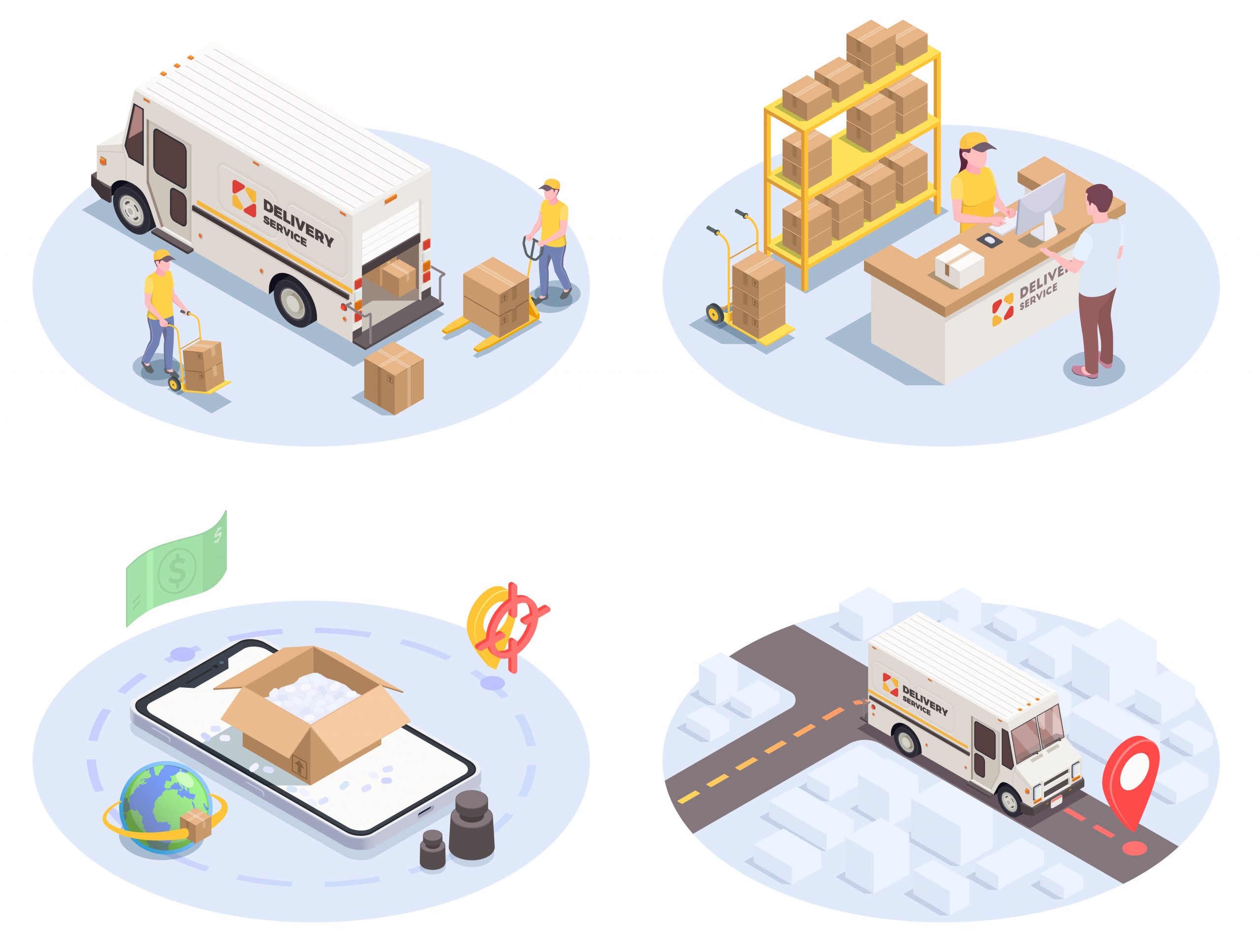
Introduction: Setting the Stage for Logistics Technology
In an era where consumer demands are increasingly complex and global supply chains are more intertwined than ever, the importance of logistics technology cannot be overstated. Once viewed as a mere cog in the wheel of commerce, logistics has evolved into a dynamic, technology-driven sector that is essential to supply chain management. Companies are realizing that streamlining logistics operations with technology is not just a necessity but a competitive advantage.
In today’s fast-paced logistics industry, embracing the latest technology trends is crucial for staying ahead of the curve. From artificial intelligence-enhanced transportation management systems to blockchain technology ensuring supply chain visibility, these advancements are reshaping how goods move, are stored, and even how they’re sold. But with the rapid pace of innovation comes a labyrinth of choices and challenges.
So, what can you expect to learn from this blog post? We will explore key logistics technology trends currently impacting the industry, their implications for supply chain management, and the challenges and opportunities they present. Whether you’re part of a logistics startup or an established player looking to modernize your technological portfolio, this comprehensive guide aims to equip you with the knowledge to navigate the rapidly changing landscape of logistics technology.
The Current State of the Logistics Industry
Welcome to the complex, ever-evolving landscape of the logistics industry. Once merely the backbone of global trade, logistics has emerged as a forward-looking domain, replete with technological innovation and critical to supply chain health. As we strive to meet the fickle consumer demands of the 21st century, it’s become clear that the rules of the game are changing—and fast.
However, even with advancements in logistics technology, challenges abound. From the uncertain geopolitical landscape affecting international trade agreements to the ongoing labor shortages exacerbated by the pandemic, the hurdles are many. Companies are faced with escalating transportation costs, tightening environmental regulations, and the relentless pursuit of operational efficiency.
Digital technologies, such as blockchain technology and big data analytics, have been hailed as saviors, offering solutions to issues like inventory management, operational excellence, and even fleet maintenance. But, these are double-edged swords; while technology can streamline operations and boost productivity, it also brings in new layers of complexity and questions about technology sustainability.
Moreover, the question of “last mile logistics analysis” looms large. As consumers increasingly expect timely delivery, solving the last-mile conundrum is paramount. The industry is also under pressure to improve customer satisfaction scores while mitigating the risks of hazardous processes in warehouse management.
In the coming sections, we’ll delve deeper into each of these challenges and explore how emerging trends in logistics technology and supply chain management offer both innovative solutions and new sets of problems. From self-driving vehicles to the role of artificial intelligence and machine learning, you’ll find a broad sweep of insights aimed at helping logistics operators, whether startups or established giants, navigate these tumultuous waters.
Defining Logistics Technology Trends
In a world driven by fast-paced innovation, logistics technology trends are not just buzzwords; they are critical roadmaps that dictate how logistics companies adapt and grow. Trends in logistics technology can be viewed as the evolving tools, tactics, and philosophies that shape the sector. Whether it’s autonomous mobile robots taking over warehouse operations or blockchain technology ensuring transparent smart contracts, staying ahead of these trends is not an option—it’s a necessity.
Why is keeping up with these trends so vital? The logistics industry is undergoing a seismic shift, underpinned by the relentless pace of technological advancements. Businesses are striving for operational excellence, faced with increasing consumer demands for quicker, more transparent services. The marketplace is unforgiving; lagging in technological adoption can hamper your supply chain and allow competitors to swoop in on your territory.
But it’s not just about playing defense. Embracing trends in logistics technology and supply chain management can empower companies to achieve new heights in operational efficiency, boost productivity, and even revolutionize last mile logistics analysis. This proactive approach enables logistics service providers to increase their overall customer satisfaction scores, maintain physical assets more effectively, and fulfill future demand more efficiently.
To remain competitive, it’s essential to stay updated on the latest logistics technology trends. In the upcoming sections, we’ll explore these trends in-depth, looking at how they’re altering the logistics landscape and what they mean for both established logistics providers and disruptive logistics startups.
Key Trends in Logistics Technology
The logistics sector is in a perpetual state of evolution, fueled by emerging technologies and ever-changing consumer demands. Staying competitive in this volatile landscape requires an in-depth understanding of the key logistics technology trends shaping the industry. Let’s dive into some of these transformative technologies that are redefining logistics operations and the supply chain.
Artificial Intelligence and Machine Learning
Artificial Intelligence (AI) and Machine Learning (ML) are more than just buzzwords; they are at the core of advanced analytics tools that are revolutionizing the logistics industry. AI and ML have a multitude of applications, from demand forecasting and inventory management to route optimization and fleet maintenance. Their capabilities for analyzing historical data and predictive analytics are enabling more efficient and streamlined operations, thus driving operational excellence.
Blockchain Technology
For years, the logistics sector has grappled with issues related to transparency, traceability, and authenticity. Blockchain technology is poised to solve these challenges. Blockchain can offer smart contracts and secure, immutable records that bring unparalleled transparency to supply chains. Its applications in shipment tracking and transaction validation are particularly noteworthy, making it one of the top logistics technology trends.
Digital Twins and Virtual Reality
The adoption of Digital Twins and Virtual Reality (VR) technologies is redefining logistics planning and warehouse processes. Digital twins create realistic digital settings that are exact replicas of physical assets and operations. They can simulate multiple scenarios, thereby helping to optimize logistics processes and minimize risks. VR takes it one step further by providing immersive experiences for training purposes, reducing the hazards involved in manual processes and boosting productivity.
Understanding these key trends is pivotal for logistics service providers who aim to meet future demand more effectively, adapt their technological portfolio in-house, and achieve higher customer satisfaction scores. These technologies not only add value to the logistics operations but also have far-reaching implications on the overall value chain, helping companies remain competitive.
In this transformative era, it’s not enough to be aware of these technologies; active integration into your logistics operations is crucial. Whether you’re a newcomer in the logistics startups scene or an established player, incorporating these cutting-edge technologies can be a game-changer in how you approach supply chain management.
The Role of Supply Chain Management in Modern Logistics
Welcome to the intricate world of logistics, where the confluence of logistics technology and supply chain management creates a symphony of processes that keep our global economy humming. If you’ve ever wondered how the pair of sneakers you ordered arrives at your doorstep within 48 hours, or how grocery stores never seem to run out of your favorite brand of coffee, the answer is simple yet profound—effective supply chain management powered by advanced logistics technology.
In the modern logistics landscape, supply chain management is far from a standalone component; it’s an integral part of a much larger ecosystem governed by technology. From transportation management systems that optimize routes for timely delivery, to sophisticated demand forecasting algorithms, technology has elevated supply chain management to new heights.
Imagine the role of demand forecasting in this mix. Gone are the days of educated guesswork. Now, companies use machine learning algorithms and big data analytics to predict future demand with astonishing accuracy. The outcome? Vastly improved inventory management, minimized wastage, and maximized profitability. This forecasting doesn’t just streamline warehouse operations; it ripples across the entire supply chain, affecting logistics planning, transportation costs, and even customer satisfaction scores.
Equally important is inventory management, another linchpin in supply chain visibility. Advanced technologies allow logistics companies to maintain precise records, track merchandise in real-time, and ensure a more efficient, less error-prone system. All of these factors contribute to a more transparent, efficient, and responsive supply chain, strengthening the competitive edge of logistics providers.
So, what can you expect to learn from this exploration? Insights into how cutting-edge logistics technology is transforming traditional supply chain management, real-world applications that boost productivity, and innovative solutions that are setting new industry standards. Get ready for a deep dive into a world where technology doesn’t just support the supply chain—it leads it.
Case Studies: Companies Doing it Right in the World of Logistics Technology
The proof is in the pudding, or so the saying goes. In the realm of logistics technology, this couldn’t be more accurate. While theories and strategies around logistics industry trends abound, real-world applications provide the most convincing evidence of what’s truly game-changing. In this section, we delve into compelling case studies of companies that have not just survived but thrived by adopting cutting-edge logistics technology trends.
For instance, consider the story of a major e-commerce giant that has revolutionized inventory management. By implementing a state-of-the-art warehouse management system fortified by artificial intelligence, the company can predict product demand down to the last unit. The result? Dramatic reductions in storage costs and skyrocketing customer satisfaction scores, all thanks to optimized inventory levels and timely delivery.
Next, let’s look at a leading freight company. Faced with the daunting task of tracking hundreds of thousands of shipments daily, the organization turned to blockchain technology. Implementing smart contracts and a transparent, immutable ledger, the company achieved unparalleled supply chain visibility. This not only streamlined operations but also dramatically decreased the number of lost or delayed shipments, providing a significant edge in a highly competitive logistics sector.
Even traditional industries are not immune to the transformative power of logistics technology. A well-known food and beverage distributor has turned to advanced analytics tools for logistics planning and demand forecasting. Using machine learning algorithms to analyze historical data, the distributor can now anticipate fluctuating market trends, enabling them to maintain optimal inventory levels, reduce waste, and ensure that perishable goods are distributed before their sell-by date.
The world of logistics is in a constant state of flux, driven by evolving consumer demands and emerging technology trends. These case studies offer valuable insights into how forward-thinking companies are leveraging technological innovations to remain competitive, streamline processes, and ultimately delight their customers.
In the following sections, we’ll dissect these case studies in more detail to uncover the strategies, technologies, and operational excellence that set these companies apart in a crowded and ever-evolving logistics industry landscape.
Challenges and Opportunities in the Logistics Industry
In a world driven by immediacy and scale, the logistics industry faces an intricate jigsaw puzzle of challenges and opportunities, especially when it comes to adopting emerging logistics technology trends. From the hustle of last-mile delivery to the complexities of supply chain management, logistics companies are under immense pressure to optimize and innovate.
One of the most immediate hurdles is the integration of modern technology into existing logistics operations. Whether it’s implementing artificial intelligence for demand forecasting or employing blockchain technology for supply chain visibility, the pathway to operational excellence is fraught with challenges. Resistance to change, the need to retrain staff, and substantial initial investments are just a few of the barriers that prevent logistics service providers from diving headfirst into the tech pool.
Yet, the silver lining is dazzling. Companies that successfully overcome these obstacles unlock a treasure trove of benefits. For example, advanced analytics tools can help in analyzing historical data, thereby fine-tuning inventory management and warehouse processes. Transportation management systems, when effectively deployed, can lead to significant cost savings and streamlined operations. Such improvements don’t just boost the bottom line; they dramatically elevate customer satisfaction scores.
Moreover, for those willing to make the technological leap, the support systems are robust. From logistics technology providers offering specialized solutions to the burgeoning number of logistics startups pioneering innovative technologies, there is a growing ecosystem aimed at enabling the logistics sector to climb higher rungs of efficiency and customer service.
For logistics companies looking to remain competitive in an ever-evolving marketplace, the call to action is clear: embrace technology, overcome the initial barriers, and unlock the incredible potential for operational efficiency and heightened customer satisfaction.
In the sections that follow, we will delve deeper into these challenges and opportunities, offering insights and strategies for successfully navigating this exciting yet challenging landscape.
The Future of Supply Chain and Logistics Technology
Picture this: Self-driving trucks navigating highways, drones carrying out last-mile deliveries, and AI algorithms optimizing global supply chains in real-time. Sounds like science fiction? Welcome to the imminent future of the logistics industry, a future underpinned by groundbreaking logistics technology trends.
We’re standing at the threshold of a revolutionary shift, where supply chain and logistics technology are converging to redefine the rules of the game. The landscape is teeming with possibilities, from artificial intelligence revolutionizing demand forecasting to blockchain technology securing smart contracts in transportation management systems.
But why should you care? Because staying ahead of these technological trends is not just beneficial; it’s imperative for survival. In an industry grappling with razor-thin margins and ever-growing consumer demands, failing to adapt to new technology trends can be a fatal mistake.
As we project into the future, several key technologies promise to disrupt traditional logistics operations. Autonomous mobile robots in warehouse operations, virtual reality for logistics planning, and advanced analytics for real-time decision-making are just a few examples.
These aren’t merely incremental upgrades; they signify a transformative shift towards a more connected, transparent, and efficient logistics sector. They offer logistics companies the tools to not only streamline processes but also to exceed customer expectations, thereby boosting overall customer satisfaction scores.
Our final thoughts? We’re on the brink of an exciting paradigm shift. The logistics industry is no longer just about ‘moving things from Point A to Point B.’ It’s about leveraging the full arsenal of digital technologies to achieve operational excellence and forge stronger, more responsive supply chains.
In the subsequent sections, we’ll deep dive into each of these upcoming trends, providing you with actionable insights to future-proof your logistics operations.
Conclusion: Wrapping Up Logistics Technology Trends and Their Impact on Supply Chain Management
As we reach the end of this insightful journey through the intricate maze of logistics technology trends, one thing is abundantly clear: The fusion of logistics technology and supply chain management is not just an evolution—it’s a transformational shift that industry leaders cannot afford to ignore.
From the power of artificial intelligence in demand forecasting to the security and transparency offered by blockchain technology, we’ve dissected the key trends that are poised to redefine logistics operations and supply chains. Case studies have substantiated the tangible benefits, while the challenges and opportunities section has highlighted the barriers and rewards in this ever-evolving landscape.
To all the industry leaders reading this: The time to act is now. Don’t get left behind in this technological revolution. Take proactive steps to integrate these innovations into your logistics and supply chain management systems, and prepare to exceed not just operational targets but also customer satisfaction metrics.


